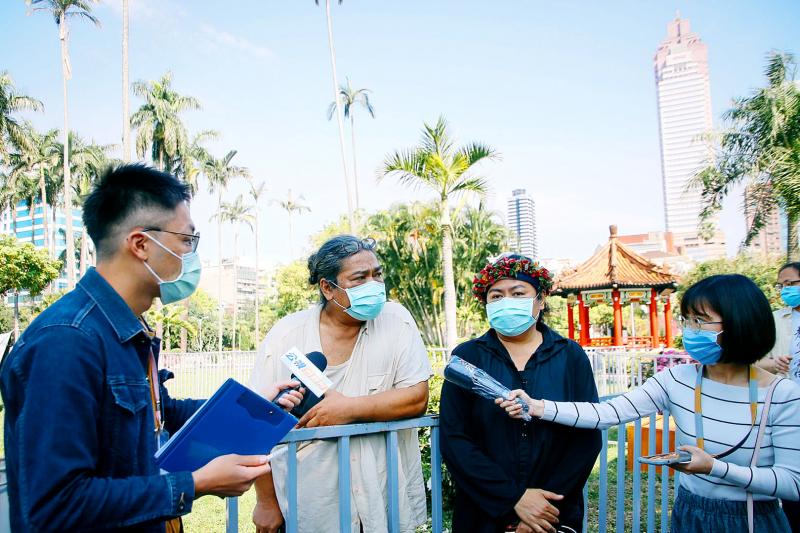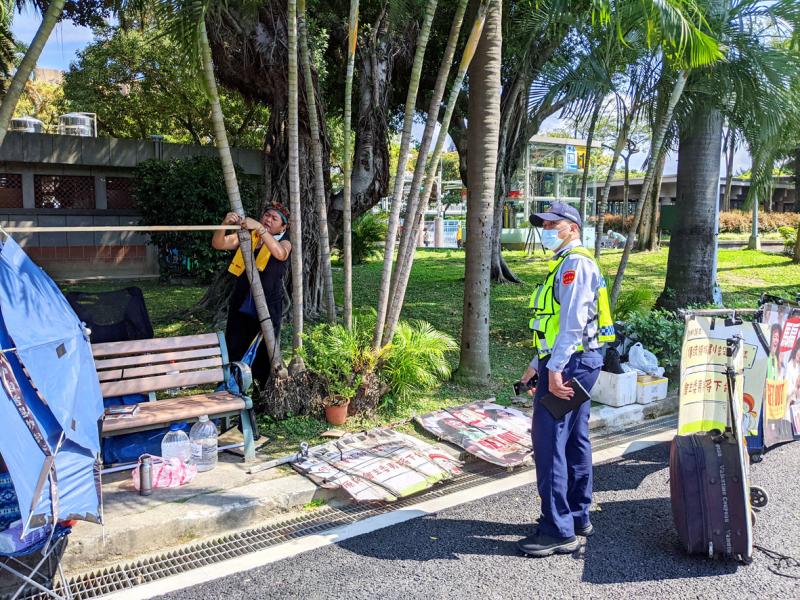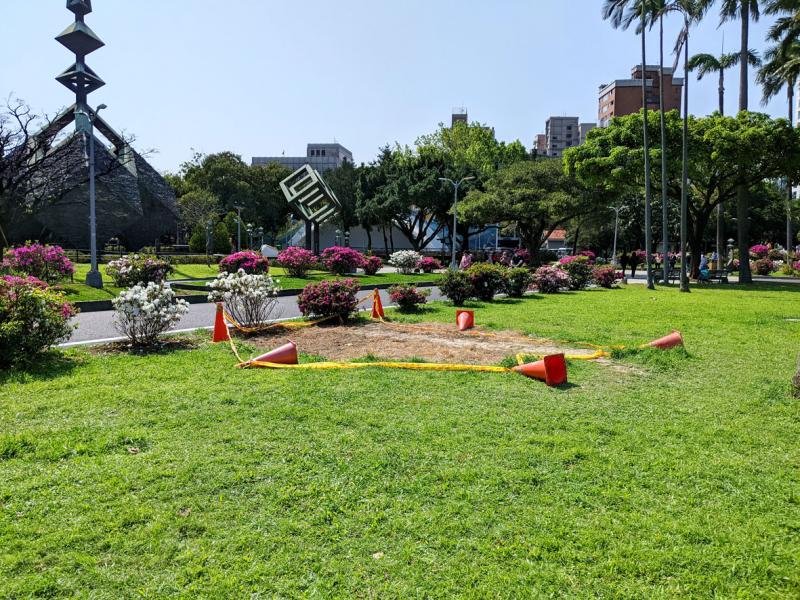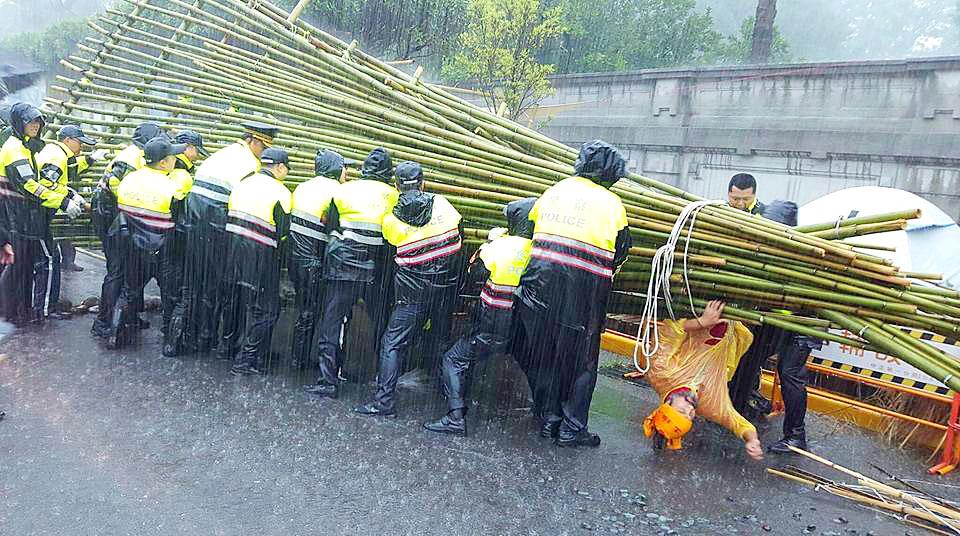Indigenous Puyuma singer and activist Panai stares solemnly at a spot of dry, beige grass where her home in Taipei’s 228 Memorial Park used to be.
On March 13, the Taipei City police announced they would tear down her encampment after almost two years of legal battles, in which the Taipei High Administrative Court ruled that Panai did not have the right to camp in the park as a form of protest. The task was completed the next day.
Panai, as well as her Bunun artist and activist husband Nabu, spent the next few nights sleeping on park benches. Since February 2017, the couple have been protesting President Tsai Ing-wen’s (蔡英文) land policy reforms for indigenous communities, which they say have not been carried out.

Photo courtesy of the Taiwan Association for Human Rights
Their protest shows that even with a government that says it supports their cause, their struggle for transitional justice — and those of indigenous communities in general — is far from over.
ROOTED IN THE LAND
On Aug. 1, 2016, President Tsai apologized to Taiwan’s indigenous peoples, promising to “begin to delineate and announce indigenous traditional territories and lands,” as a step towards realizing, “the ideals of indigenous self-government.”

Photo: Itamar Waksman
Panai and Nabu decided to pitch their tents in central Taipei that same day, protesting what they say is the theater of the president’s apology and her lack of respect for indigenous customs.
Tsai visited the couple two days later to ask for more time in implementing her promises. They believed her and returned home that same day.
Panai and Nabu have been activists for over three decades. Some of their first activism was participating in the “return our land” (還我土地) movement of the 1990’s, which centered the expropriation of indigenous land over Taiwan’s 400 years of colonization in the modern struggle for indigenous rights.

Photo: Itamar Waksman
But for Nabu, a decisive change came in 2001, when the government allowed him and other members of the Husongan community (霍松安家族) to visit their ancestral lands in the mountains of Taitung County, land from which the Japanese expelled them in 1942.
The process of gaining permission to eventually begin rebuilding his community’s home in 2006, and the reconstruction of the site since then, led Nabu to realize that without “remapping the land, and establishing a connection with it, it’s as if [we] never existed there.”
As promised, on Feb. 14, 2017, the Council of Indigenous Peoples promulgated the Traditional Territory Designation Procedure (傳統領域範圍劃設辦法), creating a process for mapping land and the authority to declare traditional indigenous territories.

Photo courtesy of the No One is an Outsider
A preliminary survey by the council found that around 50 percent of Taiwan’s land could be categorized as indigenous territories.
With the Indigenous Basic Law (原住民族基本法) guaranteeing indigenous people the right to informed consent over economic activities on their traditional lands, their demarcation could create a massive change in Taiwanese society.
TRANSITIONAL JUSTICE
But after the procedure’s announcement, many like Panai and Nabu were left unsatisfied because the council excluded private property from traditional territories.
“Our rights are to be exercised on land that has been defined as ours. Because of [the exclusion of private land], our supposed right to informed consent [turns out to be] a very small right,” she said as her voice broke off, sounding exasperated.
Panai added that with already so few rights, the exclusion of private land from traditional territories further limited the power of indigenous people.
Panai and Nabu decided that the procedures were unacceptable. A week after the procedure was announced, they, alongside their friend, director Mayaw Biho, pitched their tents in front of the Presidential Office Building on Ketagalen Boulevard.
They were soon joined by student organizations, both indigenous and Han Taiwanese, who pitched their tents in support. At that moment, a multifaceted protest movement that incorporated art and education with the central demand of land justice was born.
“We wanted real transitional justice,” said Panai, who continued to create music, releasing an EP, Ears of Rice on Ketagalan Boulevard, two months into the protest.
The most difficult moment came on the one hundredth day of the protest, when over 200 police officers came on a tempestuous winter day to forcibly evict the protesters.
Their tents forcibly torn down and possessions soaked, Panai and Nabu relocated to the park, where they remained until police removed them, waiting for President Tsai to answer their demands.
The Office of the President declined to comment for this article, directing the Taipei Times to the Council of Indigenous Peoples. The council did not respond to a request for comment.
‘HISTORIC HOMELANDS’
While the struggle over indigenous traditional territories can be traced back to the “return our land” movement, according to Lin Yi-jen (林益仁), a professor at National Taipei Medical University, it was during the presidency of Chen Shui-bian (陳水扁) that the term “traditional territories” (傳統領域) began to appear.
When Chen campaigned for the presidency, he promised a new partnership with indigenous groups. After he became president in 2000, the council began conducting land surveys to decide what groups had lived where before the nation’s colonization.
“Historic homelands are extremely important to each indigenous group’s identity. Without them, it’s very difficult for each group to define what kind of people they are,” Lin said.
However, the process of mapping traditional territories was continuously marred by problems, and by 2007 it had stalled. Tsai’s 2016 apology brought new life to this decades-long struggle.
The 2017 procedures by the council failed to define traditional lands. In June 2018, it declared the traditional territory of the Thao people (邵族) in Yuchi Township, Nantou County. However, the local government and land holders appealed the move, claiming that it was absurd to subject the township’s 15,000 residents to the whims of the 300 Thao living there.
The Executive Yuan accepted their appeal and rescinded the council’s declaration. Since then, no other traditional territories have been declared.
Panai and Nabu plan to stay in the park until President Tsai leaves office, doubting she will come to discuss their demands. After she steps down, they plan on returning to their communities to continue fostering the connection between them and the land.
The couple see their protest, and the wider struggle for traditional territories, as a fight to advance Taiwan’s democracy.
“Democratic systems are not enough to overcome the legal exploitation of peoples and resources for the sake of economic growth,” Nabu said.

Towering high above Taiwan’s capital city at 508 meters, Taipei 101 dominates the skyline. The earthquake-proof skyscraper of steel and glass has captured the imagination of professional rock climber Alex Honnold for more than a decade. Tomorrow morning, he will climb it in his signature free solo style — without ropes or protective equipment. And Netflix will broadcast it — live. The event’s announcement has drawn both excitement and trepidation, as well as some concerns over the ethical implications of attempting such a high-risk endeavor on live broadcast. Many have questioned Honnold’s desire to continues his free-solo climbs now that he’s a

Lines between cop and criminal get murky in Joe Carnahan’s The Rip, a crime thriller set across one foggy Miami night, starring Matt Damon and Ben Affleck. Damon and Affleck, of course, are so closely associated with Boston — most recently they produced the 2024 heist movie The Instigators there — that a detour to South Florida puts them, a little awkwardly, in an entirely different movie landscape. This is Miami Vice territory or Elmore Leonard Land, not Southie or The Town. In The Rip, they play Miami narcotics officers who come upon a cartel stash house that Lt. Dane Dumars (Damon)

As Taiwan’s second most populous city, Taichung looms large in the electoral map. Taiwanese political commentators describe it — along with neighboring Changhua County — as Taiwan’s “swing states” (搖擺州), which is a curious direct borrowing from American election terminology. In the early post-Martial Law era, Taichung was referred to as a “desert of democracy” because while the Democratic Progressive Party (DPP) was winning elections in the north and south, Taichung remained staunchly loyal to the Chinese Nationalist Party (KMT). That changed over time, but in both Changhua and Taichung, the DPP still suffers from a “one-term curse,” with the

Today Taiwanese accept as legitimate government control of many aspects of land use. That legitimacy hides in plain sight the way the system of authoritarian land grabs that favored big firms in the developmentalist era has given way to a government land grab system that favors big developers in the modern democratic era. Articles 142 and 143 of the Republic of China (ROC) Constitution form the basis of that control. They incorporate the thinking of Sun Yat-sen (孫逸仙) in considering the problems of land in China. Article 143 states: “All land within the territory of the Republic of China shall